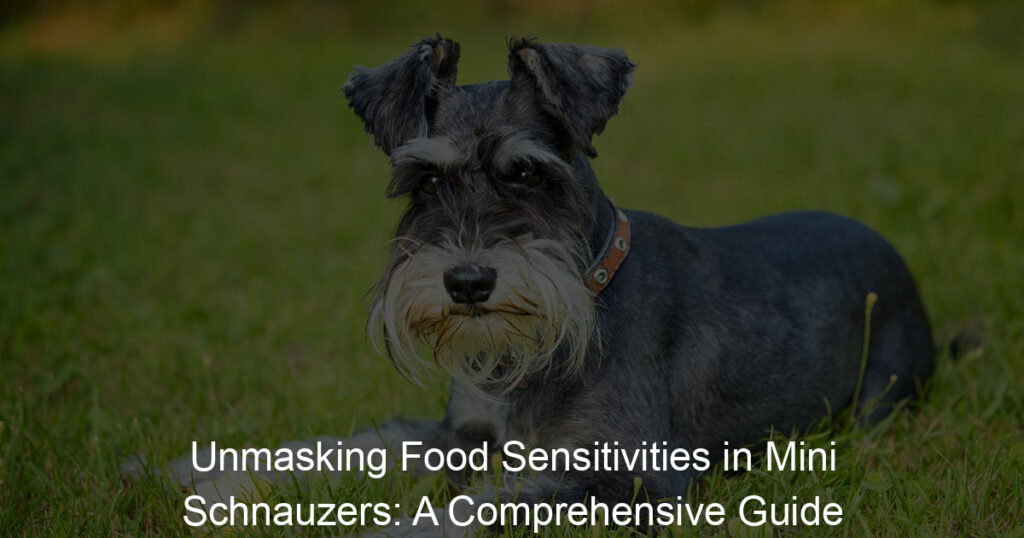
Introduction to Mini Schnauzers Food Sensitivities
Just like humans, dogs can also have food sensitivities. In particular, Mini Schnauzers, a popular breed known for their lively personality and distinctive looks, can be susceptible to certain food sensitivities. In this section, we will delve into understanding the concept of food sensitivities in Mini Schnauzers and the importance of identifying these sensitivities.
- Understanding the concept of food sensitivities in Mini Schnauzers
- Importance of identifying food sensitivities in Mini Schnauzers
Food sensitivities in Mini Schnauzers refer to their adverse reactions to certain types of food or ingredients. These reactions are often caused by the dog’s immune system mistakenly identifying a harmless ingredient as a threat, leading to various symptoms such as skin irritations, gastrointestinal issues, and even behavioral changes. It’s important to note that food sensitivities are different from food allergies. While allergies trigger an immediate immune response, sensitivities often result in delayed reactions, making them harder to identify.
Identifying food sensitivities in Mini Schnauzers is crucial for their overall health and wellbeing. Unaddressed food sensitivities can lead to chronic discomfort and serious health problems over time. For instance, continuous consumption of food that a Mini Schnauzer is sensitive to can result in persistent skin issues, frequent upset stomach, and even changes in behavior such as increased aggression or anxiety. Moreover, knowing your Mini Schnauzer’s food sensitivities allows you to provide a diet that is not only nutritious but also safe and comfortable for your beloved pet.
In the following sections, we will discuss how to identify food sensitivities in Mini Schnauzers, address these sensitivities, understand their dietary needs, and prevent food sensitivities from occurring. Our goal is to help you provide the best possible care for your Mini Schnauzer, ensuring they lead a happy, healthy, and comfortable life.
Identifying Food Sensitivities in Mini Schnauzers
Food sensitivities can be a common issue in Mini Schnauzers. It’s important to identify these sensitivities early to ensure your pet’s health and happiness. Here are some common symptoms to watch out for:
Common Symptoms of Food Sensitivities in Mini Schnauzers
- Changes in Appetite: One of the first signs of food sensitivities in Mini Schnauzers is a change in their appetite. They may start eating less or show a lack of interest in their food. This can be a clear indicator that something is not right with their diet.
- Digestive Issues: Digestive issues like diarrhea, vomiting or constipation can also be a sign of food sensitivities. If your Mini Schnauzer is experiencing these symptoms frequently, it could be due to a reaction to certain foods.
- Changes in Behavior: Changes in behavior can also indicate food sensitivities. If your Mini Schnauzer is acting unusually tired, irritable, or anxious, it could be a result of discomfort from food sensitivities.
Remember, these symptoms can also be signs of other health issues, so it’s important to consult with a vet if you notice any changes in your Mini Schnauzer’s behavior or physical health. Early detection and treatment of food sensitivities can greatly improve your pet’s quality of life.
Diagnostic Tests for Identifying Food Sensitivities
Identifying food sensitivities in Mini Schnauzers can be a challenging task. However, there are several diagnostic tests that veterinarians commonly use to help pinpoint the cause of your pet’s discomfort. Let’s take a closer look at these tests.
- Blood tests
- Elimination diet trials
- Food allergy testing
Blood tests are often the first step in diagnosing food sensitivities. These tests can detect specific antibodies in your Mini Schnauzer’s blood that indicate a reaction to certain foods. While blood tests can provide valuable information, they are not always 100% accurate. Some dogs may test positive for food sensitivities, even if they are not experiencing any symptoms.
Elimination diet trials are another common method used to identify food sensitivities. This involves removing certain foods from your Mini Schnauzer’s diet and then gradually reintroducing them to see if symptoms reappear. This process can be time-consuming and requires careful monitoring, but it is often the most reliable way to identify specific food sensitivities.
Food allergy testing is similar to blood tests, but it specifically looks for an immune response to certain foods. This test can be helpful in distinguishing between a food sensitivity and a true food allergy, which are two different conditions. However, like blood tests, food allergy testing is not always 100% accurate and should be used in conjunction with other diagnostic methods.
Remember, every Mini Schnauzer is unique and what works for one dog may not work for another. It’s important to work closely with your veterinarian to find the best approach for diagnosing and managing your pet’s food sensitivities.
Addressing Mini Schnauzers Food Sensitivities
When it comes to our beloved Mini Schnauzers, their health is our top priority. One common issue that many Mini Schnauzers face is food sensitivities. These sensitivities can lead to discomfort and health problems if not properly addressed. Let’s delve into how we can treat food sensitivities in Mini Schnauzers.
Treating Food Sensitivities in Mini Schnauzers
There are several ways to treat food sensitivities in Mini Schnauzers. The most effective methods include dietary changes, medication, and alternative therapies. Let’s explore each of these in more detail.
- Dietary Changes
- Medication
- Alternative Therapies
One of the most effective ways to address food sensitivities is by making changes to your Mini Schnauzer’s diet. This could involve eliminating certain foods that trigger reactions and introducing hypoallergenic or specially formulated diets. Always consult with your vet before making any significant changes to your pet’s diet.
In some cases, medication may be necessary to manage food sensitivities in Mini Schnauzers. These medications can help to reduce inflammation and other symptoms associated with food sensitivities. It’s important to remember that medication should always be administered under the guidance of a vet.
Alternative therapies, such as acupuncture and homeopathy, can also be effective in treating food sensitivities in Mini Schnauzers. These therapies work by boosting the dog’s immune system and reducing inflammation. However, it’s crucial to consult with a professional before starting any alternative therapy.
In conclusion, addressing food sensitivities in Mini Schnauzers involves a combination of dietary changes, medication, and alternative therapies. It’s important to work closely with your vet to determine the best course of action for your pet. Remember, every Mini Schnauzer is unique, and what works for one may not work for another.
Case Study: Treating a Mini Schnauzer with Food Sensitivities
Let’s dive into a real-life example to better understand how food sensitivities in Mini Schnauzers can be addressed effectively. This case study involves a Mini Schnauzer named Max.
- Background of the case:
- Treatment approach:
- Outcome and key takeaways:
Max, a 4-year-old Mini Schnauzer, had been experiencing recurring bouts of digestive issues. His owner noticed that he often had an upset stomach after meals. Despite trying different brands of dog food, the problem persisted. A visit to the vet confirmed that Max was dealing with food sensitivities, a common issue among Mini Schnauzers.
Max’s vet recommended a two-pronged approach. First, a dietary change was in order. Max was put on a hypoallergenic diet, specifically designed for dogs with food sensitivities. This diet excluded common allergens like wheat, soy, and certain types of meat. Second, Max was prescribed a course of medication to manage his symptoms and improve his digestive health.
After a few weeks on the new diet and medication, Max’s symptoms significantly improved. His stomach issues became less frequent, and he seemed more energetic and happier overall. This case highlights the importance of identifying and addressing food sensitivities in Mini Schnauzers. It also underscores the effectiveness of a combined approach involving dietary changes and medication.
Addressing food sensitivities in Mini Schnauzers can be a challenge, but with the right approach, it’s possible to manage the condition and improve the quality of life for these adorable dogs. Remember, every dog is unique, so what worked for Max might not work for all. Always consult with a vet for the best course of action.
Mini Schnauzers Dietary Needs
Understanding the dietary needs of your Mini Schnauzer is crucial for their overall health and well-being. One common issue that these dogs face is a sensitive stomach. Let’s delve into this topic to help you provide the best care for your furry friend.
Understanding Mini Schnauzers Sensitive Stomach
Just like humans, Mini Schnauzers can also have sensitive stomachs. This sensitivity can lead to discomfort and other health issues if not properly managed. Here, we will discuss the causes of a sensitive stomach and how to manage it effectively.
- Causes of sensitive stomach
- Food allergies: Mini Schnauzers can be allergic to certain types of food, causing stomach upset.
- Dietary indiscretion: Eating too quickly, or consuming non-food items can lead to stomach issues.
- Stress: Just like humans, dogs can also experience stress, which can lead to digestive problems.
- How to manage a sensitive stomach
- Dietary changes: Switching to a diet that’s specially formulated for dogs with sensitive stomachs can help. This usually involves high-quality, easily digestible proteins and carbohydrates.
- Regular feeding schedule: Feeding your dog at the same times each day can help regulate their digestive system.
- Stress management: Providing a calm, stable environment can help reduce stress-related digestive issues.
There are several reasons why your Mini Schnauzer might have a sensitive stomach. Some common causes include:
Managing a sensitive stomach in Mini Schnauzers involves a few key steps:
Understanding your Mini Schnauzer’s dietary needs and managing their sensitive stomach can significantly improve their quality of life. Always consult with your vet before making any major changes to your dog’s diet or lifestyle.
Recommended Diet for Mini Schnauzers with Food Sensitivities
Feeding your Mini Schnauzer properly is crucial, especially if they have food sensitivities. Here are some guidelines to help you provide a balanced and safe diet for your furry friend.
- Types of food to include
- Types of food to avoid
- Sample diet plan
Mini Schnauzers with food sensitivities can still enjoy a variety of foods. High-quality, easily digestible proteins like chicken, turkey, and fish are excellent choices. Include carbohydrates like sweet potatoes and brown rice, which are gentle on the stomach. Don’t forget to add fiber-rich vegetables, such as carrots and peas, for good digestive health. Always choose natural, unprocessed foods whenever possible.
Just as there are foods to include, there are also foods to avoid. Steer clear of common allergens like wheat, soy, and corn. Avoid foods with artificial colors, flavors, and preservatives, as these can trigger adverse reactions. High-fat foods can be hard to digest for Mini Schnauzers with sensitive stomachs, so limit their intake of fatty meats and dairy products.
A sample diet plan for a Mini Schnauzer with food sensitivities might look like this:
| Meal | Food |
|---|---|
| Breakfast | 1/4 cup of boiled chicken and 1/4 cup of sweet potato |
| Lunch | 1/4 cup of turkey and 1/4 cup of brown rice |
| Dinner | 1/4 cup of fish and 1/4 cup of peas |
Remember, this is just a sample plan. Always consult with your vet before making any significant changes to your pet’s diet.
Preventing Food Sensitivities in Mini Schnauzers
Preventing food sensitivities in Mini Schnauzers is a crucial aspect of their health and well-being. It involves regular vet check-ups, a balanced diet, and regular exercise. Let’s delve into each of these aspects.
- Importance of Regular Vet Check-ups
- Benefits of a Balanced Diet
- Role of Exercise in Preventing Food Sensitivities
Regular vet check-ups are essential in preventing food sensitivities in Mini Schnauzers. These check-ups allow the vet to monitor your pet’s health and detect any early signs of food sensitivities. According to a study, 1 in 10 dogs may develop food sensitivities in their lifetime. Regular vet visits can help reduce this risk by identifying and addressing potential issues before they become serious problems.
A balanced diet is another key factor in preventing food sensitivities. It ensures that your Mini Schnauzer gets all the necessary nutrients without any harmful ingredients that could trigger a sensitivity. A balanced diet should include a mix of proteins, carbohydrates, and fats, along with essential vitamins and minerals. For instance, a diet rich in Omega-3 fatty acids can help reduce inflammation, which is often associated with food sensitivities.
Exercise plays a vital role in preventing food sensitivities. Regular physical activity helps maintain a healthy digestive system, which is crucial in preventing food sensitivities. Exercise also aids in maintaining a healthy body weight, which can reduce the risk of developing food sensitivities. A study found that dogs who are overweight are more likely to develop food sensitivities than those who maintain a healthy weight.
In conclusion, preventing food sensitivities in Mini Schnauzers involves regular vet check-ups, a balanced diet, and regular exercise. By following these steps, you can help ensure your Mini Schnauzer lives a healthy and happy life.














